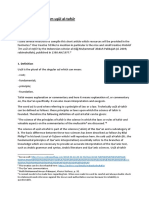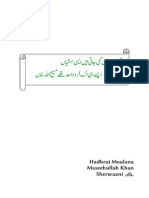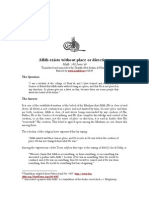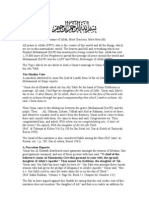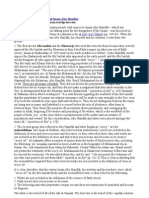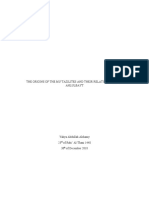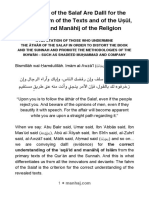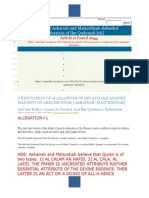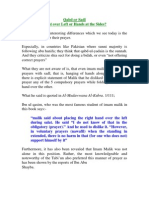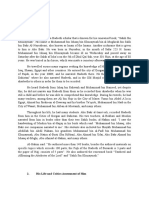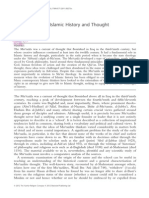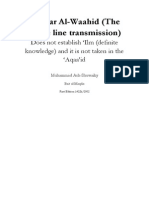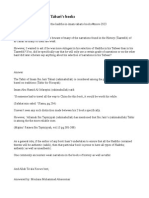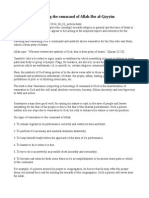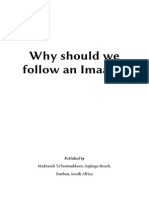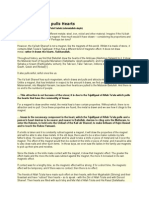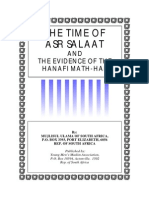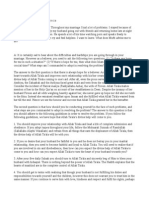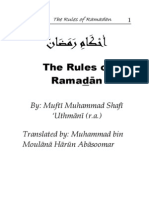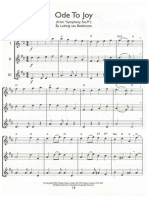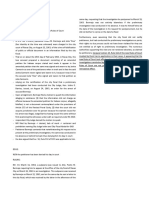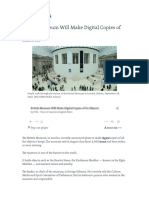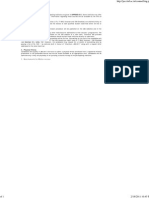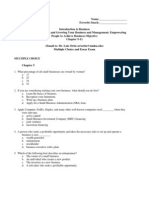Imam Al-Qurtubi's Tafsir of The Ayah: He Then Established Himself Over The Throne'
Imam Al-Qurtubi's Tafsir of The Ayah: He Then Established Himself Over The Throne'
Uploaded by
takwaniaCopyright:
Available Formats
Imam Al-Qurtubi's Tafsir of The Ayah: He Then Established Himself Over The Throne'
Imam Al-Qurtubi's Tafsir of The Ayah: He Then Established Himself Over The Throne'
Uploaded by
takwaniaOriginal Title
Copyright
Available Formats
Share this document
Did you find this document useful?
Is this content inappropriate?
Copyright:
Available Formats
Imam Al-Qurtubi's Tafsir of The Ayah: He Then Established Himself Over The Throne'
Imam Al-Qurtubi's Tafsir of The Ayah: He Then Established Himself Over The Throne'
Uploaded by
takwaniaCopyright:
Available Formats
He Then Established Himself Over the Throne1 alImm al-Qurtub
Released by www.marifah.net 1429 H
Regarding Gods statement (may He be exalted): He then established Himself over the
Throne 2 Throne
This is the theological issue of establishment (al-istiw). The scholars have spoken at length regarding this issue. We have shown the various positions of the scholars in the book
The Radiant Explanation of Gods Most Beautiful Names and Lofty Attributes 3, where we
made mention of fourteen opinions. Most of both the early and latter-day scholars have held that if it is obligatory to affirm the transcendence (tanzh) of the Originator (tala) from the limitations of direction (jiha) and spatial confinement (ta ayyuz), then - according to the generality of early scholars and the foremost latter-day scholars - the need to affirm His transcendency (may He be blessed and exalted) of direction (jiha) necessarily follows as a corollary; for according to these scholars, He is not attributed with moving in an upwards direction, since, in their view, specifying for
Extracted from al-Imm al-Qurtubs Tafsr : 7:54.
http://www.altafsir.com/Tafasir.asp?tMadhNo=0&tTafsirNo=5&tSoraNo=7&tAyahNo=54&tDisplay=yes& UserProfile=0
2 3
Qurn: Chapter 7, Verse 54
al- Asn f shar asm Allh al- usn wa iftihi al-ul
Him a direction logically necessitates that He be situated in a place (makn)4 or within spatial confines ( ayyiz), both of which logically necessitate that that which is spatially confined be capable of movement and stillness as well as change (taghayyur) and occurrence in time ( udth). This is the opinion of the scholastic theologians (al-mutakallimn). And the early salaf (May Allah be pleased with them all) did not speak in negation of a direction for Allah nor did they affirm it [a direction]. Rather, what they and the rest did was to affirm it [al-istiw] in the manner that it was affirmed in Allahs book and in the manner in which His Messengers informed of it.5 Nor did any of the pious predecessors ever deny that He established Himself over the Throne in reality. He specifically mentioned the Throne because of its stature as the greatest of his creations. Rather, they did not know the modality (kayfiyya) of His establishment (al-istiw), for its reality ( aqqa) cannot be known. Mlik (may God be merciful towards him) said: The establishment (al-istiw) is known, -meaning, lexically -- and the how (kayf) is unknown (majhl), and inquiring about it [al-
istiw] is a blameworthy innovation (bidah)6. And thus spoke Umm Salama (may God be
pleased with her). In sum, this amount of discussion suffices. Whoever wishes to go further in this matter should have recourse to the relevant sections in the works of the specialized scholars.
Elsewhere Imam al-Qurtub says: al-Tabar narrated from some people that they said: He is al-Al (the High)
over His creation by way of elevation of His place over their place. Ibn Atiyah said: And this is the view of the ignorant anthropomorphists.
5
Elsewhere Imm al-Qurtub describes the methodology of the salaf with respect to the allegorical verses
saying: it is known that the madhhab of the Salaf (pious predecessors) was to leave the undertaking of interpreting them while being certain that the literal meaning ( awhir) was impossible. So they would say, Let it pass as it came! And some of them (the Salaf) took the madhhab of manifesting its interpretations by interpreting it with meanings consistent with the (Arabic) tongue without definitively confirming a specific possible meaning. [see: http://www.marifah.net/index.php?option=com_content&task=view&id=183&Itemid=47]
6
The authentic report related to us from Imm Mlik via Ibn Wahb is actually as follows: We were with Mlik
when a man asked him: O Ab Abd Allah! The Merciful is established over the Throne (20:5): how is His establishment? Mlik lowered his head and began to sweat profusely. Then he lifted up his head and said: The Merciful is established over the Throne just as He described Himself. One cannot ask how. How does not apply to Him. And you are an evil man, a man of innovation. Take him out! The man was led out. (Narrated by al-Bayhaq with a sound chain in al-Asm wa al- ift (2:304-305 #866), al-Dhahab in the Siyr (7:416), and Ibn Hajar in Fath al-Br (1959 ed. 13:406-407; 1989 ed. 13:501).)
Establishment (al-istiw) in the language of the Arabs means rising above (uluww) and settlement (istiqrr). Al-Jawhar says, It was beyond having any crookedness; and he established himself upon the back of his riding animal, meaning settled himself thereupon; and he rose up to the sky, meaning aspired; and he became established, meaning he overpowered and conquered. He said: Bishr became established over Iraq without recourse to sword or the spilling of blood, and the man became established, meaning the days of his youth ended. A thing is established if it is straight, symmetrical or well-balanced (itadala). Ab Umar b. Abd al-Barr reports from Ab Ubayda that the latter commented upon God
AllMost Highs statement, The All-Merciful became established on the throne 7 saying was became throne
elevated above (al). And, as a poet said, For you granted them water in the desolate desert, as the star of Canopus circled around and then settled, meaning ascended and rose high. Therefore, I say: the elevation (uluww) of God Most High and His being raised high (irtif) is an expression of the exaltedness (uluww) of His Glory (majd), His Attributes, and His Sovereignty; meaning, there is none that is above Him or vies with him in His Majesty, nor is there anyone who shares with Him His Highness (uluww); rather, He is the Most High without any qualification, may He be most praised.
In the chapter of H, verse no. 5
You might also like
- Nayl Shawkani MusicDocument5 pagesNayl Shawkani MusicTalibNo ratings yet
- Aqidah Tahawiyyah - English TranslationDocument172 pagesAqidah Tahawiyyah - English Translationtakwania100% (4)
- T Shirt CaseDocument2 pagesT Shirt CaseKarishma Doshi0% (1)
- T24 Setting Up A Nostro AccountDocument10 pagesT24 Setting Up A Nostro Accountlolitaferoz100% (2)
- The 10 Mabādī of Ilm U Ūl Al-TafsirDocument4 pagesThe 10 Mabādī of Ilm U Ūl Al-TafsirHarun MafhūmNo ratings yet
- Biography of Abu Baker Al Razi & HisLife and WorkDocument50 pagesBiography of Abu Baker Al Razi & HisLife and Workmooshi68100% (4)
- Tabieen Kadhim Al-Muftari - Ibn Asakir: Great Asha'ari Scholars - GF HaddadDocument12 pagesTabieen Kadhim Al-Muftari - Ibn Asakir: Great Asha'ari Scholars - GF HaddadDawudIsrael1No ratings yet
- Lubaab'l Al Madkhal PDFDocument75 pagesLubaab'l Al Madkhal PDFMAliyu2005No ratings yet
- Arba'in Fil Wurood Il Mahdi Al Maw'OodDocument17 pagesArba'in Fil Wurood Il Mahdi Al Maw'OodRuhan Madni NaqashNo ratings yet
- Hadhrat Moulana Maseehullah - RADocument319 pagesHadhrat Moulana Maseehullah - RAtakwania100% (1)
- Nuh Ha Mim Keller - Is Allah Literally in The SkyDocument8 pagesNuh Ha Mim Keller - Is Allah Literally in The SkyMTYKKNo ratings yet
- The Illuminating Lantern: Commentary of the 30th Part of the Qur'anFrom EverandThe Illuminating Lantern: Commentary of the 30th Part of the Qur'anNo ratings yet
- Tawassulawliya GfhaddadDocument3 pagesTawassulawliya GfhaddadShadab ChangeziNo ratings yet
- Allah Exists Without A PlaceDocument3 pagesAllah Exists Without A PlaceSalafiaqidahNo ratings yet
- ImamAlMizziHisBriefIncarcerationAndTheKhalqOfImamAlBukhari PDFDocument67 pagesImamAlMizziHisBriefIncarcerationAndTheKhalqOfImamAlBukhari PDFAnonymous JWUsx1No ratings yet
- The Letter of Imām Abū Hanīfah To Imām Uthmān Al Battī 2Document14 pagesThe Letter of Imām Abū Hanīfah To Imām Uthmān Al Battī 2John DoeNo ratings yet
- Jamaa'ah At-Tableegh (Tableeghi Jamaat) : (Popularly Referred To As - "Fazail Amal")Document40 pagesJamaa'ah At-Tableegh (Tableeghi Jamaat) : (Popularly Referred To As - "Fazail Amal")TCFNo ratings yet
- Kita B Al-Muz (Hir of Jala L Al-Di N AL-SUYU T - I : A Critical Edition and Translation of Section Twenty On Islamic TermsDocument34 pagesKita B Al-Muz (Hir of Jala L Al-Di N AL-SUYU T - I : A Critical Edition and Translation of Section Twenty On Islamic TermsAbu Mohammed RiyanNo ratings yet
- The Marriage of 'Umar Ibn Al-Khattab With Umm Kulthum Bint 'Ali (Allah Be Well-Pleased With Them)Document14 pagesThe Marriage of 'Umar Ibn Al-Khattab With Umm Kulthum Bint 'Ali (Allah Be Well-Pleased With Them)danisharib100% (1)
- The Concept of Al-Maslaha Wa Al-Nass With Special Reference To Kitab Al-Buyu' in The Book of Bulugh Al-MaramDocument324 pagesThe Concept of Al-Maslaha Wa Al-Nass With Special Reference To Kitab Al-Buyu' in The Book of Bulugh Al-Maramibnzul100% (3)
- Al Albani UnveiledDocument72 pagesAl Albani Unveiledguyii86No ratings yet
- The Obligation of TaqlîdDocument64 pagesThe Obligation of TaqlîdYounus Ali100% (1)
- An Explanation of The Irja' of Imam Abu HanifahDocument3 pagesAn Explanation of The Irja' of Imam Abu HanifahtakwaniaNo ratings yet
- El Fadl Islamic Law and Muslim Minorities PDFDocument40 pagesEl Fadl Islamic Law and Muslim Minorities PDFAl-IslamPLNo ratings yet
- Bernard Weiss - The Theory of Tawatur According To GhazaliDocument26 pagesBernard Weiss - The Theory of Tawatur According To GhazaliGiovanniM.Carrera100% (1)
- UsulAlKarkhi EnglishednDocument68 pagesUsulAlKarkhi EnglishednAnonymous mtunH0tNo ratings yet
- Imam Ahmad Ibn Hanbal - The Champion of Islamic BeliefDocument3 pagesImam Ahmad Ibn Hanbal - The Champion of Islamic BeliefDhantel Rhesa PrawedhaNo ratings yet
- A Re-Examination of Al-Ash Arī's Theory of Kasb According To Kitab Al-Luma PDFDocument12 pagesA Re-Examination of Al-Ash Arī's Theory of Kasb According To Kitab Al-Luma PDFistanbul1453No ratings yet
- Takhreej of Narrations Present in Shia EncyclopediaDocument11 pagesTakhreej of Narrations Present in Shia EncyclopediaJuragan TamvanNo ratings yet
- Khatib Al BaghdadiDocument320 pagesKhatib Al BaghdadighouseNo ratings yet
- The Origins of The Mutazilites and Their Relationship With Ahlulbayt (VC)Document11 pagesThe Origins of The Mutazilites and Their Relationship With Ahlulbayt (VC)Qadiri DervishNo ratings yet
- Athar Salaf EvidenceDocument22 pagesAthar Salaf EvidenceLito MendozaNo ratings yet
- The Beliefs of The Ash Arīs: in A Calm Dialogue With The Specious Arguments of Their Opponents - Answering Safar Al-Hawali: Part 1Document4 pagesThe Beliefs of The Ash Arīs: in A Calm Dialogue With The Specious Arguments of Their Opponents - Answering Safar Al-Hawali: Part 1takwaniaNo ratings yet
- 06 Ibn Taymiyya andDocument42 pages06 Ibn Taymiyya andShep Smith100% (1)
- Defending Ashairah and Maturidiah and Refuting Ibn QudamaDocument17 pagesDefending Ashairah and Maturidiah and Refuting Ibn QudamaAHLUSSUNNAH WAL JAMAA"AH [ASHA:'IRAH & MATURIDIYAH]No ratings yet
- Fitra Ibn HazmDocument20 pagesFitra Ibn HazmSo' FineNo ratings yet
- Istighatha - Imam Shamsuddin RamliDocument2 pagesIstighatha - Imam Shamsuddin Ramliapi-20006410No ratings yet
- Ibn Tymiyyah Sufi SheikhDocument15 pagesIbn Tymiyyah Sufi SheikhD BNo ratings yet
- Qabd or Sadl in SalatDocument28 pagesQabd or Sadl in SalatSlaveOfAhlubait100% (1)
- Zaidi Book About Prayer (Salaat) and Other RitualsDocument134 pagesZaidi Book About Prayer (Salaat) and Other RitualsRafah ZaighamNo ratings yet
- Ibn KhuzaimahDocument5 pagesIbn KhuzaimahAyadi Muhajir100% (1)
- Muqaddimah Usool Al Hadith (Shah Abdul Haq Muhadith Dehlavi) - English (Commentary by Muhammad Nabeel Musharraf)Document95 pagesMuqaddimah Usool Al Hadith (Shah Abdul Haq Muhadith Dehlavi) - English (Commentary by Muhammad Nabeel Musharraf)Muhammad NabeelNo ratings yet
- Ibn Taymiyyas Fatwa On AbortionDocument22 pagesIbn Taymiyyas Fatwa On Abortionadeelq2409No ratings yet
- Campanini - Mu'tazila PDFDocument10 pagesCampanini - Mu'tazila PDFFrancesco TivoliNo ratings yet
- One of The Sahibayn, and The Imaam of Ahnaaf:: "Qaadhi Aboo Yoosuf Ya'qoob Bin Ibraheem"Document24 pagesOne of The Sahibayn, and The Imaam of Ahnaaf:: "Qaadhi Aboo Yoosuf Ya'qoob Bin Ibraheem"mkhader1989No ratings yet
- Madinah To Karbala Part 2Document282 pagesMadinah To Karbala Part 2mbazalNo ratings yet
- 'Aqīdah Write-Up - Qari Sauleh Peck PDFDocument54 pages'Aqīdah Write-Up - Qari Sauleh Peck PDFFizza DinNo ratings yet
- Hanbali Sufi HistoryDocument10 pagesHanbali Sufi HistoryDawudIsrael1100% (1)
- Concept of State in Islam - Feb 15, 06Document51 pagesConcept of State in Islam - Feb 15, 06Ahmad FarooqNo ratings yet
- Questions On MawlidDocument92 pagesQuestions On MawlidMohamed Ali Rauff100% (1)
- Book No. 5 Physical Presence of Our Prophet After Death (FINAL)Document51 pagesBook No. 5 Physical Presence of Our Prophet After Death (FINAL)Kabeer AhmedNo ratings yet
- An Incident of Istighatha (Asking For Help)Document3 pagesAn Incident of Istighatha (Asking For Help)skquadri7No ratings yet
- Rafidi Narrators in BukhariDocument2 pagesRafidi Narrators in Bukharidonjawz4767No ratings yet
- Talfiq Mixing MadhabsDocument4 pagesTalfiq Mixing MadhabsradiarasheedNo ratings yet
- Ebu Hasan Al-Ashari and The Asharites in Islamic RDocument45 pagesEbu Hasan Al-Ashari and The Asharites in Islamic RdibekhNo ratings yet
- Al Aqwal Al RajihaDocument265 pagesAl Aqwal Al RajihaАбу ЯхьяNo ratings yet
- Al Albani Unveiled - With Important Fatwas and Disclaimers AttachedDocument33 pagesAl Albani Unveiled - With Important Fatwas and Disclaimers AttachedRaana Khan100% (1)
- Khabar Al-Waahid (The Single Line Transmission) - Muhammad Ash-ShuwaikyDocument72 pagesKhabar Al-Waahid (The Single Line Transmission) - Muhammad Ash-ShuwaikyNoNo ratings yet
- Exposing the Khawarij Infiltration of the Blessed Muhammadan NationFrom EverandExposing the Khawarij Infiltration of the Blessed Muhammadan NationNo ratings yet
- The Mulid of al-Sayyid al-Badawi of Tanta: Egypt's Legendary Sufi FestivalFrom EverandThe Mulid of al-Sayyid al-Badawi of Tanta: Egypt's Legendary Sufi FestivalNo ratings yet
- The House of Muhammad: The Sectarian Divide and the Legacy About “Aya Tatheer”From EverandThe House of Muhammad: The Sectarian Divide and the Legacy About “Aya Tatheer”No ratings yet
- The Hadiths in Imam Tabari's BooksDocument1 pageThe Hadiths in Imam Tabari's BookstakwaniaNo ratings yet
- Radiant Reality May 2014Document48 pagesRadiant Reality May 2014takwaniaNo ratings yet
- Six Signs of Respecting The Command of Allah by Ibn Al-QayyimDocument2 pagesSix Signs of Respecting The Command of Allah by Ibn Al-QayyimtakwaniaNo ratings yet
- Why Should We Follow An Imaam?Document160 pagesWhy Should We Follow An Imaam?takwaniaNo ratings yet
- The Magnet That Pulls Hearts by Hazrat Maulana Yunus Patel Saheb (Rahmatullah Alayh)Document2 pagesThe Magnet That Pulls Hearts by Hazrat Maulana Yunus Patel Saheb (Rahmatullah Alayh)takwaniaNo ratings yet
- Does Allah Love You !easy Way To Gain Allah's LoveDocument1 pageDoes Allah Love You !easy Way To Gain Allah's LovetakwaniaNo ratings yet
- The Time of Asr SalaatDocument16 pagesThe Time of Asr SalaattakwaniaNo ratings yet
- Who Knows BetterDocument5 pagesWho Knows BettertakwaniaNo ratings yet
- Are We Creating A Society of BeggarsDocument2 pagesAre We Creating A Society of BeggarstakwaniaNo ratings yet
- The Recent Maqra-ah'/Hadith Majlis TrendDocument22 pagesThe Recent Maqra-ah'/Hadith Majlis TrendtakwaniaNo ratings yet
- The Hadith Which Promises The Reward of 100 MartyrsDocument5 pagesThe Hadith Which Promises The Reward of 100 MartyrstakwaniaNo ratings yet
- Imam Abu Hatim Razi (رحمه الله), One Who Memorized 300 000 Hadith!Document2 pagesImam Abu Hatim Razi (رحمه الله), One Who Memorized 300 000 Hadith!takwaniaNo ratings yet
- Some Pearls of WisdomDocument24 pagesSome Pearls of WisdomtakwaniaNo ratings yet
- Marital ProblemsDocument2 pagesMarital ProblemstakwaniaNo ratings yet
- The Rules of Ramadan by Mufti Mahomed Shafi Saheb R.A.Document60 pagesThe Rules of Ramadan by Mufti Mahomed Shafi Saheb R.A.takwaniaNo ratings yet
- Fazaaile MadinahDocument108 pagesFazaaile MadinahtakwaniaNo ratings yet
- Love of Allah Leads To Perfect Ikhlas-Imam Rabbani R.A.Document1 pageLove of Allah Leads To Perfect Ikhlas-Imam Rabbani R.A.takwaniaNo ratings yet
- Causes, Types & Effects of Kibr (Pride & Arrogance) in One's LifeDocument2 pagesCauses, Types & Effects of Kibr (Pride & Arrogance) in One's LifetakwaniaNo ratings yet
- Foreign Currency Translation: Learning ObjectiveDocument24 pagesForeign Currency Translation: Learning ObjectiveJohn Rashid HebainaNo ratings yet
- Resume - Crecencia Fatima Lay Cabral: Personal DetailsDocument2 pagesResume - Crecencia Fatima Lay Cabral: Personal DetailsTithus CarvalhovitalNo ratings yet
- Homework Grid Ideas Year 4Document6 pagesHomework Grid Ideas Year 4afnkceovfqcvwp100% (1)
- Trio Ode A La Joie BeethovenDocument2 pagesTrio Ode A La Joie BeethovenVictoria CreightonNo ratings yet
- Chapter 9 - Accent and Dialect-RehamDocument7 pagesChapter 9 - Accent and Dialect-Rehampro tranNo ratings yet
- StatCon CasesDocument123 pagesStatCon CasesTishreen Mariam I. Bahjin100% (1)
- RC - My Special Birthday MealDocument2 pagesRC - My Special Birthday MealAmal MansoorNo ratings yet
- The Principle of Emptiness: A Presentation by Rajiv BajajDocument37 pagesThe Principle of Emptiness: A Presentation by Rajiv BajajhareshNo ratings yet
- Bermejo vs. Barrios RealinoDocument1 pageBermejo vs. Barrios RealinoGigi SaldiviaNo ratings yet
- English Text Statue of LibertyDocument1 pageEnglish Text Statue of LibertyAndrea CastroNo ratings yet
- My Bible A PoemDocument3 pagesMy Bible A PoemRob RehkemperNo ratings yet
- British Museum Will Make Digital Copies of Its ObjectsDocument4 pagesBritish Museum Will Make Digital Copies of Its ObjectsJelena RodicNo ratings yet
- Idioms AccentureDocument30 pagesIdioms Accenturevikas 5G9No ratings yet
- De Thi Hoc Ki 1 Mon Anh Lop 12Document4 pagesDe Thi Hoc Ki 1 Mon Anh Lop 12Hồ Viết TiênNo ratings yet
- Montar GateWay y DHCP Server en Ubuntu 12.04Document3 pagesMontar GateWay y DHCP Server en Ubuntu 12.04juanpe69No ratings yet
- BBBL2023 April May 2021Document10 pagesBBBL2023 April May 2021YANG YUN RUINo ratings yet
- Construction Performance and Resource Optimization Chapter One Overview of Construction Performance ManagementDocument62 pagesConstruction Performance and Resource Optimization Chapter One Overview of Construction Performance Managementhaile mulunehNo ratings yet
- Garden Manor Bungalow With Lift BrochureDocument2 pagesGarden Manor Bungalow With Lift Brochurecelina kohNo ratings yet
- Understanding The Marketing PlanDocument58 pagesUnderstanding The Marketing Planjunver100% (5)
- Fire Extinguisher Spares: TENDER NO.: NCM1716064Document18 pagesFire Extinguisher Spares: TENDER NO.: NCM1716064pmcmbharat264No ratings yet
- Speech of Senator Bong GoDocument2 pagesSpeech of Senator Bong GoJoshua TorresNo ratings yet
- JUAN PONCE ENRILE v. SANDIGANBAYANDocument4 pagesJUAN PONCE ENRILE v. SANDIGANBAYANCandelaria QuezonNo ratings yet
- JEE11 Counsellin&AdmsnDocument1 pageJEE11 Counsellin&AdmsnIndiaresultNo ratings yet
- Updates in Labor LawDocument53 pagesUpdates in Labor LawPeter Carlo DavidNo ratings yet
- Lucas TVSLimitedChennaiDocument17 pagesLucas TVSLimitedChennaiAnbu LoveNo ratings yet
- IICS R38 Cloud DIS OD 202202 LG E - 637807065150345733Document397 pagesIICS R38 Cloud DIS OD 202202 LG E - 637807065150345733Learn vmajjaNo ratings yet
- Multiple Choice QpsDocument8 pagesMultiple Choice QpsshobsundarNo ratings yet
- Print ApplicationDocument1 pagePrint ApplicationSmarttNo ratings yet




